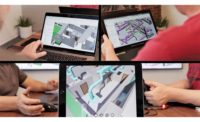On September 12, professional associations representing architects in Denmark, Finland, Iceland and Norway sent a letter to Autodesk CEO Andrew Anagnost criticizing current limitations of the company's Revit product and urging the hastened development of other design tools as well as pricing commensurate with the level of development dollars devoted to design products.
"Every day, digital design leaders around the world wrestle with software, which at its core is 20 years old and incapable of the potential of multi-core computing and graphics power designed to process within today's real and virtual workstations," read the letter signed by leaders of the Association of Practising Architects in Norway, the Association of Finnish Architects’ Offices, the Danish Association of Architectural firms and SAMARK and the Association of Architectural Firms in Iceland.
Autodesk acquired its flagship 3D design tool, Revit, in 2002.
"Project productivity in architectural and engineering practices is hit daily because of the lack of scalability and product performance, which then requires sophisticated and practice-specific ‘work arounds,'" the letter continued. The demands follow a 2020 letter from UK architects that had similar requests and one that, in responding, Autodesk admitted it had under-invested in development of its design technology products in recent years. In June 2021, the Architects’ Council of Europe and the European Federation of Engineering
Consultancy Associations released a position paper on the lack of competition in the software industry and fully endorsing the initiative and proposals from the original 2020 letter. Today, more than 14,000 architects have joined the call for more and better development of core Autodesk design tools' code or more competition from other companies in design authoring tools.
Autodesk responded to the letter with a blog post from Executive Vice President of AEC Design Amy Bunszel. While promising more news Sept. 26-29 at the company's upcoming Autodesk University conference, Bunszel defended development since 2020, saying "across the last two Revit releases we’ve delivered more than 130 new product enhancements and features that are a direct result of customer ideas and feedback provided via Revit Ideas."
Bunszel's blog post did not address multicore or GPU processing and touted interoperability enhancements, a new Hub for Revit transparency and a generally "more open Revit" via a partnership with the Open Design Alliance.
For the architects, though, the workarounds that are needed to use their design tools without taking advantage of their own powerful workstation computers create more difficult processes than are necessary to complete their projects.
"It would, of course, be fantastic if they started listening to us and took this a bit more serious than just a few one-hour road-map sessions here and there, and really tried to understand the pain points that we have," said Jens Majdal Kaarsholm, director of design technology at Bjarke Ingels Group in Copenhagen.
Beyond development, the letter states that while improvements in the software have been what it calls "miniscule," licensing costs have comparatively "soared."
"License policies have been constantly changing to the advantage of Autodesk, not its customers. Floating multi-user licenses to single and named users has contributed to both increasing license costs and administrative costs," it reads.
Among the requests from the associations is a series of in-person workshops between stakeholders from the associations and Autodesk, with a goal of creating "a platform built on modern code, capable of smooth model performance regardless of project complexity."






Post a comment to this article
Report Abusive Comment